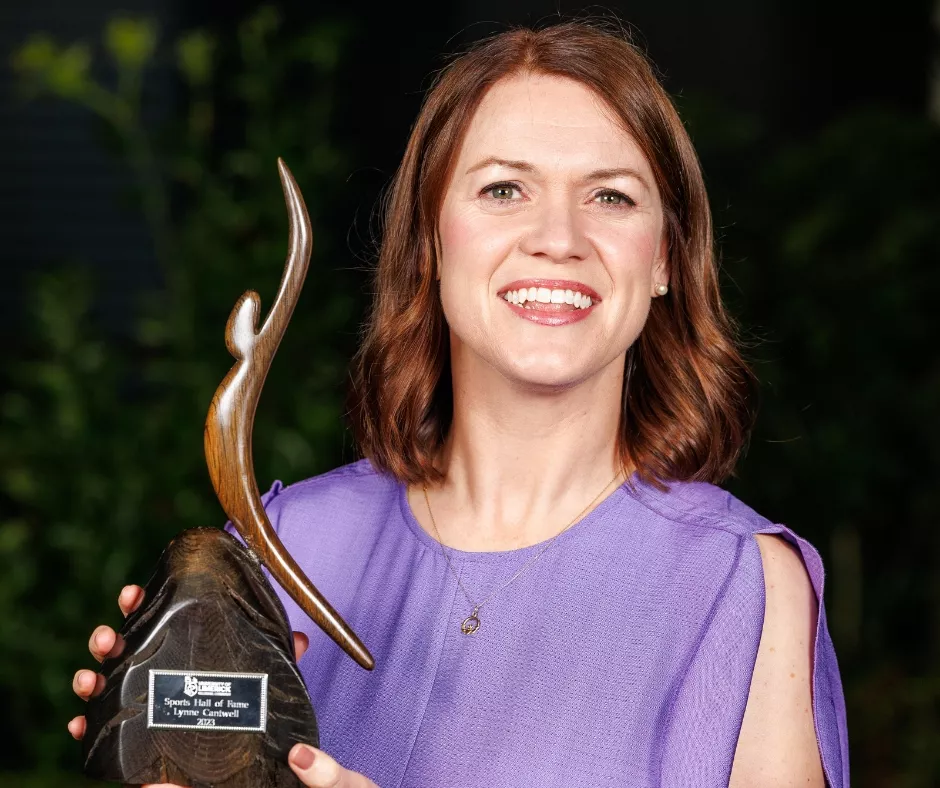

When curiosity overtakes a young mind, it can be the catalyst to take a journey of discovery and one that Lynne Cantwell embarked on bringing her for home in Dublin, to the rugby playing fields of Limerick and now to a role of leadership in South Africa – and all the while this journey was forged and supported by the brilliant female leaders this country has produced.
Graduating from University of Limerick in 2003, Lynne describes herself as a “young jackeen” who had never been away from her family home in Dublin where parents Peggie and Tom supported the dreams and hopes of Lynne and siblings Richard and Dawn.
Brought up in a Gaelic football and soccer household, Lynne’s first sport, however, was athletics and a stint with Fingallians AC in Swords would have her under the attentive care of coach Joey Evans.
Lynne’s sporting teens primed her curiosity towards performance sports which is why she applied to do sports science at University of Limerick, a move that changed her course of travel significantly.
During her time at UL, Lynne says that she was incredibly lucky to join the UL athletics club under Drew and particularly Hayley Harrison’s watch. In the era when elite stars like Gary Ryan, Tom Comyns and Thomas Coman were all training for the Sydney Olympics in 2000, Lynne found herself learning quite a lot from that training group.
College life is where you foster friendships that endure time, uncover opportunities and meeting Sarah Keane, daughter of the late Moss Keane was the opening that Lynne had to try her hand, and turn of pace at rugby. After not much convincing, Lynne swapped her running shoes for rugby boots and took to the pitch one Wednesday afternoon to give it a go.
Little did Lynne know but that was an era of rugby royalty in UL. Players on the UL team at this point were Patrique Kelly, Sarah Jane Belton, Fiona Coghlan, Edel Coen, Louise Beamish and Caroline Mahon… all of whom represented Ireland then or in the future.
Within a year of playing, UL Bohemians started a club team and most of that UL team transitioned to play with Bohs. One of the biggest strengths of that team and one of Lynne’s biggest on-field influences was head coach Ian Costello. Since then, “Cosie” has gone on to do great things but reflecting on what shaped Lynne’s understanding of the game and technical skills had Cosie as a core influence. UL Bohs went on to win 10 all Ireland’s through that era.
Through that successful UL and UL Bohemians golden era, women’s rugby was in its infancy at a national level. Lynne started out on the wing and played for six years with the team before they won their first game. 2006 became a turning point when Ireland beat Spain for the first time clocking their first-ever test win.
It was through this era that a budding leadership team emerged between Lynne, Fiona Coghlan and Joy Neville. In 2007, Ireland beat Scotland for the first time, then Wales, then France and by 2013 they took scalps from all of the Six Nations sides and were crowned the grand slam champions for 2013.
The following year Ireland arrived at the Rugby World Cup in hot form. In a tricky pool against USA, Kazakstan and defending champions New Zealand, Ireland threw the competition open by beating NZ, advancing to the semifinals and eventually finishing 4th in the world, something that had never been achieved before or since.
This marked the end of Lynne’s on-field rugby career but the dawn of a new chapter. She had earned 86 caps in the green jersey and still holds the mantle for most capped Irish women’s rugby player to date.
Using the knowledge and experience gained through her career, Lynne felt very passionate about women’s sport and its abundant potential. Her scientist lens didn’t see gender when it came to sport, it just saw potential.
Lynne grew up in a household of strong and capable women in mother Peggie and older sister Dawn. She was a young teenager when Mary Robinson was president, and an older teenager when Sonia O’Sullivan was dominating Irish sport. All these female leadership influences always made her aspire to what was possible for her.
She was blessed to be taught in UL by the late Jacinda O’Brien who introduced her to the concept of how society influences gender norms. And the importance, as sport’s future leaders, to see through these barriers to help people maximise who they want to be, not what society wants them to be.
With this motivation, Lynne soon became a board member with Sport Ireland and took on the chair role on their Women in Sport Committee. Over the next four years and through the women in sport policy, Irish sport has made significant advances on female board representation, nationwide increased funding into women’s sport, introduced a maternity policy for female carded athletes, driven insight and launched programs to increase recruitment and retention of teenage girls in sport, female coaches and referees as well as women in sports media.
By now a mum of two, Scarlett and Arlo and wife to Alex, Lynne was headhunted by South Africa Rugby to take on the women’s high-performance manager’s role in their system. Three years later, their third baby Ngaio arrived. As a family, they committed to the role and moved to Cape Town, and as Lynne says, something “that would not have been possible had it not been for the titanic support from Alex”.
 Student Centre (SU-101)
Student Centre (SU-101)
University of Limerick
Limerick, Ireland
Phone: 353 61 202475
Email: ulaa@ul.ie